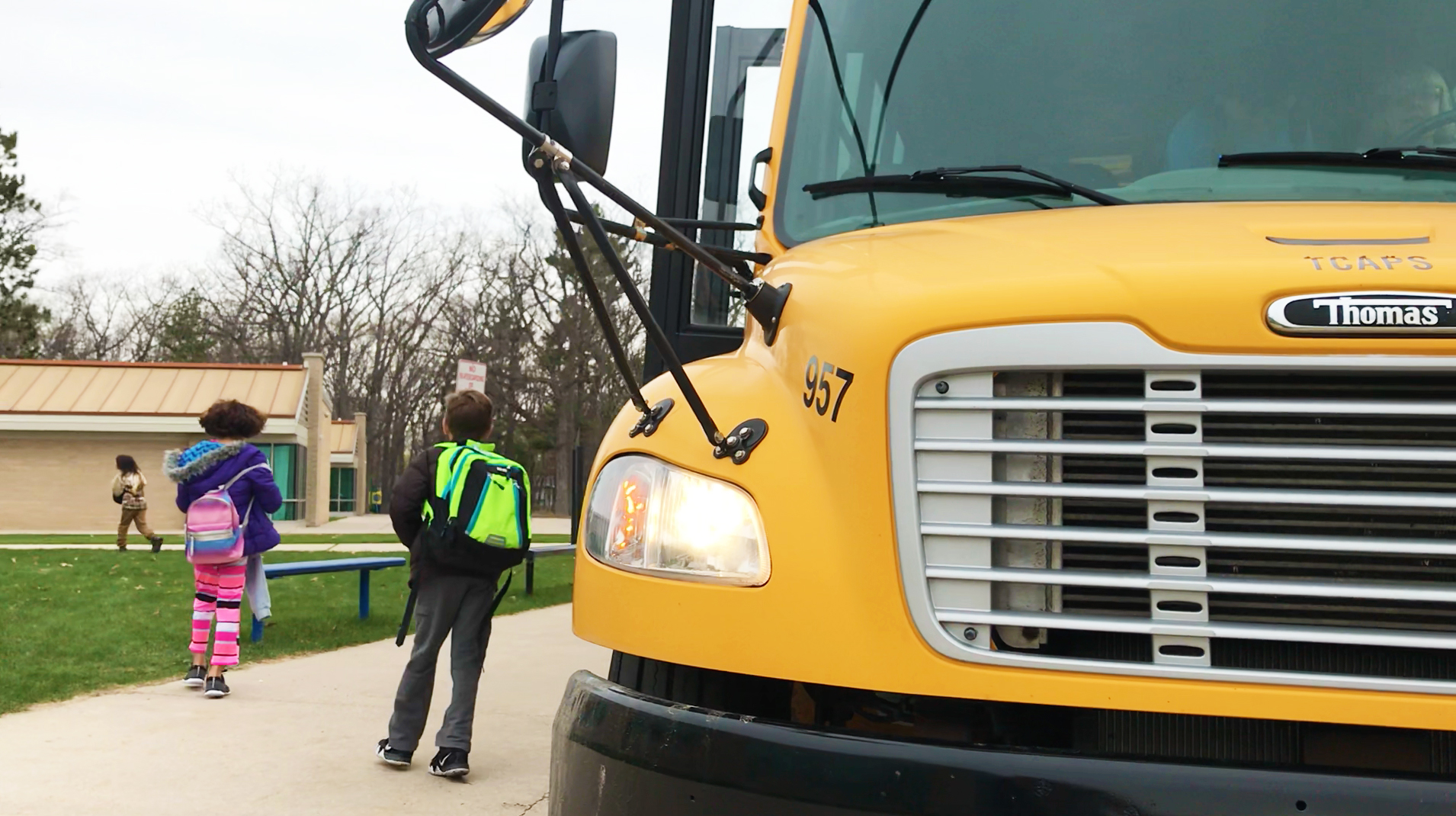
A Look At The State Budget Proposal That Could Help Solve Transportation Funding Challenges For Local Schools
By Craig Manning | May 6, 2023
Could northern Michigan finally be getting a lifeline to solve some of its school transportation challenges? Thanks to a $150 million allocation that’s being discussed as a potential part of Michigan’s Fiscal Year 2024 budget, the state’s approach to funding busing for school districts could be in for its first real makeover in almost 30 years. Local school leaders say the extra funding would make a huge difference for geographically-dispersed school districts like Traverse City Area Public Schools (TCAPS), and would create a ripple effect in spending that would allow districts to allocate more money to youth mental health programs, staff salaries, classroom resources, and more.
Currently, public school districts in Michigan pay for transportation out of what is called the “foundation grant,” or the amount of per-pupil funding that most public school districts receive from the state each year. Critics say this approach creates funding inequity in education because some rural districts have much larger geographical footprints than others. With more space to traverse, those districts naturally spend more money on busing than districts with smaller radiuses. Under the current funding model, though, districts with bigger transportation burdens don’t receive any extra funding from the state compared to districts that spend less on transportation.
Advocates for funding reform conclude that the existing approach is unfair, because some districts get to spend more of their foundation grant money in the classroom while others have to set aside significant portions of that cash just to get kids to and from school.
Speaking to The Ticker last fall about the unique hurdles that rural school districts face, TCAPS Superintendent Dr. John VanWagoner pointed to transportation as “the number one piece of the equation” for school funding inequity in the state of Michigan. That Ticker article was prompted by a then-brand-new study from Michigan State University, which found that rural schools spend “nearly $200 more per enrolled student” on transportation than urban districts.
“The amount we spend just on diesel fuel each year alone would do so much to help us in other areas,” VanWagoner said at the time. “Districts that don’t have those expenses, what does that allow them to do with that extra money? It’s things like paying employees more, or reducing class sizes. It gives them a little bit of a competitive advantage.”
VanWagoner ultimately concluded that the Michigan legislature needed to create a “categorical” in the state budget that would take into account the differences in transportation spending from one district to the next. Categoricals, or categorical grants, are additional funds allocated to school districts by the state – separate from the foundation grant – that are earmarked to be spent exclusively on specific programs. Things like special education and career and technical education are already funded by categorical grants – and school transportation used to be, until a 1995 legislative shift rolled it into the foundation grant.
“A formula needs to be created, based on the amount of miles you drive and the amount of kids you have, and then that formula dictates the per-pupil payment you get for transportation,” VanWagoner said last fall. “In my mind, that would go a long way toward solving the problem.”
Depending on what happens in Lansing with the in-progress FY 2024 state budget, VanWagoner could get his wish. The Michigan House of Representatives Appropriations Subcommittee on School Aid and Education has proposed a new categorical for school transportation funding, and that categorical is expected to be included in the House’s budget proposal for next year.
The proposal itself has northern Michigan ties: It was brought to the table this spring by 103rd House District Representative Betsy Coffia (D-Traverse City) – her first standalone bill proposal since she beat Republican incumbent Jack O’Malley to claim the House seat last November. As figured into the House budget plan, the categorical would create a $150 million fund for school transportation allocations. Per Coffia, the state would then use a formula for “factoring in some additional funding [for districts] depending on how many students and how many miles the school district has to drive.”
“I tried to send a message, with this being my first standalone bill, to emphasize how important [equitable school transportation funding] really is – not just to my district, but to all rural districts across the entire state,” Coffia tells The Ticker. She notes that, in early conversations with VanWagoner and other educational leaders in her district – which spans all of Leelanau County and parts of Grand Traverse and Benzie counties – it became clear that busing costs were a major challenge.
“I read an article in the Benzie Record Patriot, about their district getting some new buses,” Coffia adds. “And there was this startling statement about how their buses drive 2,500 miles a day, which would be the equivalent of driving a student from Benzie to San Francisco every day. That really puts things in perspective. You have these rural districts with these massive bus routes, and the money for all of that – upkeep, maintenance, fuel – that comes out of the general fund. We need that money in the classroom. We need that for extra mental health. We need that for full-time staff.”
Dr. Nick Ceglarek, superintendent for Northwest Education Services (North Ed), sees the proposal as a win for all northern Michigan school districts. North Ed services 16 districts across the five-county northwest Michigan region, including Benzie and TCAPS, and Ceglarek says none of those districts are strangers to big geographic reach or the transportation challenges it poses.
“Benzie has 350 square miles,” Ceglarek notes. “TCAPS is just north of 300 square miles. Kingsley is 122 square miles. Kalkaska’s got 440 square miles. In all those districts, there are significant costs when having to transport kids to and from school. In the 2021-22 school year, Benzie Schools spent $1.2 million on transportation alone. TCAPS spent $5.1 million. If you do the math, that equates to more than $850 per child in Benzie and almost $550 per child for TCAPS. And that money has to come right off the top of their foundation grant.”
VanWagoner isn’t ready to claim victory just yet. The categorical has to make it into the final state budget first, which will involve some back-and-forth between the House, the Senate, and the governor's office. Still, he’s grateful to Coffia for giving districts like TCAPS something to be optimistic about.
“This is, finally, I think, a real strong chance to meet the inequities that we’ve faced,” VanWagoner says of the proposal. “It doesn’t fully fund [school transportation] – it would take about $450 million to fully address the problem – but we would be excited to get this established. It allows us to take some money to put back into the classroom, and to put it into mental health that we so desperately need for our children. And so, we are imploring the Senate side of the legislature, as well as the governor, to fund this proposal and finally give us an opportunity to level some of the playing field for our kids.”
Comment






